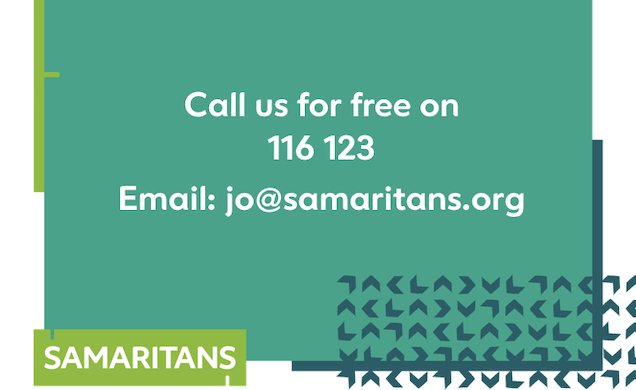HEALTH WARNING
We are no longer updating our Covid-19 hub regularly. That includes this page. Click here for the latest.
'Talking can be life-saving'

Samaritans is currently providing emotional support to people over 7,000 times a day via phone, email and letter. The organisation estimates that one in three contacts relate to coronavirus in one way or another.
Joe Potter, Samaritans Policy Manager said: ‘Suicide is complex and rarely caused by one thing. We know there is a range of psychological, social, cultural and economic factors that influence suicide risk. Our 2012 Samaritans Men and Suicide report found that suicide and deprivation are closely linked and that factors such as relationship breakdown, unemployment and not having the same type of social network as most women, have a role in increasing the risk of suicide for middle-aged men. These problems are also felt more acutely at this life-stage, as people have typically invested a great deal into their work and relationships, and the possibilities for making changes in these areas are limited.
‘From our research, we also know that men are often taught, through childhood, to embody a masculine ideal rather than focusing on social and emotional skills. The “healthy” ways men cope might involve using exercise or music to manage stress or worry, rather than talking, and their relationships may be based more around shared activity than speaking about emotional issues.
The power of human connection
‘Lockdown will be increasing isolation and disconnection for many of these men, which is likely to exacerbate their problems. In a recent study, men who are struggling told Samaritans that social connection and meaningful activity were crucial parts of any support service they might access. It’s important that these principles are central to any service targeting this group.
‘Now more than ever, it is important that we don’t lose the power of human connection. We might have been physically isolated for months and this has taken a toll on many particularly those who are struggling, but that doesn’t mean that we have to be socially isolated. Talking can be life-saving – whether it’s with a colleague, a family member, friend or a confidential helpline like Samaritans.’
Matt, who is a Samaritans volunteer and team leader said: ‘At our branch in the south of England, there are coronavirus-related calls. A lot of first-time callers are talking about it. But predominantly calls cover the same issues as before the pandemic.
'Open prison'
‘There’s more loneliness and isolation even among people who usually have support networks in place. For very active people, they’re struggling with not working and not seeing people. They talk to friends on the phone but there’s no interaction. You put the phone down and you’re alone again. One caller used the term "open prison". Some really busy people say they’ve realised how small their world actually is.
‘Callers are having to deal with the things happening in their lives on their own without the support networks they had pre-Covid. For example, people who have been bereaved and have to deal with the death and the funeral with no interaction with family and friends. Being alone means you can’t properly grieve, people say. Grief is a collective thing.
Work and financial worries
‘Work is an issue. People are losing jobs and then finding themselves alone when all their socialising was through work.
‘This links in to financial worries such as people who have been furloughed struggling because they know it won’t last and they may then lose their jobs. People are worrying about about what might happen as well as what has already happened. For some callers, money worries have led to them having to give up the internet which also means giving up a key communication tool. This in turn increases isolation.
‘For people with longer term mental health conditions, they’re now being provided with support online rather than in person and that’s difficult. It’s not the same as real contact.’
Whatever you are going through, you don’t have to face it alone. Call Samaritans for free on 116 123, email jo@samaritans.org or visit www.samaritans.org to find out more information.
- Samaritans Coronavirus support
- Support the Samaritans Emergency Appeal
- Out of Sight, Out of Mind - Samaritans report into middle-aged men and suicide.
|
The Men’s Health Forum need your support It’s tough for men to ask for help but if you don’t ask when you need it, things generally only get worse. So we’re asking. In the UK, one man in five dies before the age of 65. If we had health policies and services that better reflected the needs of the whole population, it might not be like that. But it is. Policies and services and indeed men have been like this for a long time and they don’t change overnight just because we want them to. It’s true that the UK’s men don’t have it bad compared to some other groups. We’re not asking you to ‘feel sorry’ for men or put them first. We’re talking here about something more complicated, something that falls outside the traditional charity fund-raising model of ‘doing something for those less fortunate than ourselves’. That model raises money but it seldom changes much. We’re talking about changing the way we look at the world. There is nothing inevitable about premature male death. Services accessible to all, a population better informed. These would benefit everyone - rich and poor, young and old, male and female - and that’s what we’re campaigning for. We’re not asking you to look at images of pity, we’re just asking you to look around at the society you live in, at the men you know and at the families with sons, fathers and grandads missing. Here’s our fund-raising page - please chip in if you can. |


